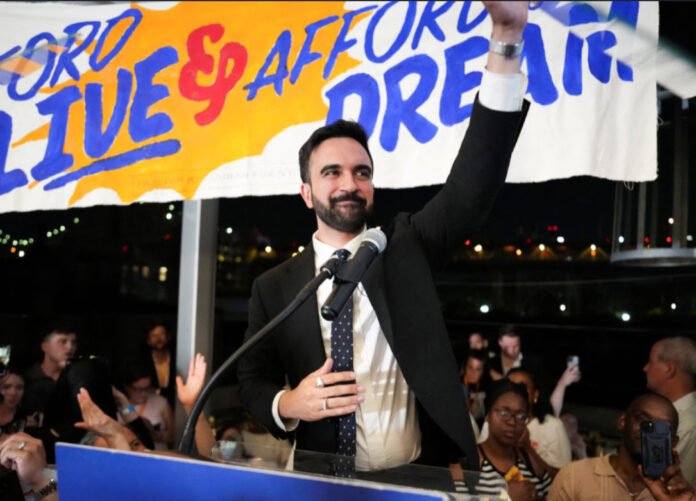Introduction to Mamdani’s Victory
Jabari Mamdani’s recent triumph in New York City’s Democratic mayoral primary marks a pivotal moment in the city’s political landscape. With a diverse and densely populated electorate, New York City has long been known for its vibrant politics, making this victory particularly significant. Mamdani’s ascent signals a shift in voter priorities and a potential departure from the status quo established by previous administrations.
The Democratic primary process in New York City is a crucial gateway for candidates, with Party affiliation often determining the electoral hierarchy in a city where Democrats dominate. Historically, the primary serves as a crucial litmus test for candidates yearning to lead in the general election. Mamdani’s victory can be attributed to a combination of grass-roots campaigning, a clear focus on issues relevant to the community, and an appeal to younger voters who are increasingly becoming part of the electorate.
As the primary unfolded, the political momentum surrounding Mamdani gained traction, driven by his policies focused on social justice, affordable housing, and equitable economic growth. Running against his opponents, Mamdani emphasized a transformative vision for the city, resonating with voters amidst a growing desire for progressive change. This electoral success aligns with a broader trend seen across various political platforms, where electorate discontent has fueled a demand for innovative leadership.
Moreover, the announcement of former Governor Andrew Cuomo’s concession following Mamdani’s primary victory adds an additional layer of complexity to the state’s political framework. Cuomo’s withdrawal not only impacts the future relationship between city and state governance but also underscores a changing tide in voter expectations and accountability in leadership roles. This moment sets the stage for a deeper exploration of Mamdani’s proposed policies and their anticipated effects on the city’s future.
Mamdani’s Political Ideology and Policy Proposals
As a progressive leader, Mamdani’s political ideology is rooted in the belief that government should play a critical role in addressing social inequities and improving the quality of life for all New Yorkers. His campaign thrust focuses on affordable housing, public safety, education reform, and climate change—issues paramount to the residents of New York City. Throughout his campaign, Mamdani has emphasized the urgent need for policy changes that differentiate his approach from prior administrations, particularly that of Andrew Cuomo.
On affordable housing, Mamdani proposes a comprehensive strategy aimed at increasing the availability of low-income housing units. He advocates for the expansion of rent control measures and believes in the necessity of substantial investments in housing infrastructure. This approach seeks to alleviate the housing crisis and ensure that all NYC residents can secure safe and affordable homes, countering the previous administration’s tendency to prioritize market-driven solutions.
In the realm of public safety, Mamdani supports community-based policing strategies that foster trust between law enforcement and the communities they serve. He emphasizes the importance of mental health resources and social services to address the root causes of crime, contrasting sharply with Cuomo’s more traditional, enforcement-focused policies. His vision seeks to create safer neighborhoods through collaboration rather than confrontation.
Education reform is another cornerstone of Mamdani’s campaign, with a focus on equitable funding for public schools and increased access to early childhood education. He believes that systemic change is crucial for creating a fair educational landscape that serves every child, irrespective of their background. This stands in stark contrast to previous policies that often emphasized standardized testing and accountability measures.
Finally, Mamdani’s approach to climate change includes ambitious initiatives aimed at reducing the carbon footprint of the city. He advocates for green infrastructure, renewable energy sources, and sustainable practices that aim to make New York City a leading example of environmental responsibility. His policies illustrate a forward-thinking approach that resonates with voters increasingly concerned about climate justice.
Mamdani’s political beliefs and policy proposals reflect a commitment to transformative change, appealing to the aspirations of New Yorkers ready for a new era in leadership.
Implications of Mamdani’s Victory for New York City
The recent victory of Mamdani in the Democratic mayoral primary signals the dawn of a transformative era for New York City. His leadership style and policy approaches suggest potential shifts in governance that prioritize inclusivity and community engagement. Mamdani’s grassroots campaign has resonated with a diverse electorate, indicating a move towards more representative governance. This could lead to a stronger emphasis on local accountability and responsiveness to the concerns of various communities throughout the city.
Community engagement is poised to take a forefront position under Mamdani’s leadership. His approach advocates for collaborative decision-making processes that involve residents in shaping policies that affect their lives. This is likely to foster greater trust between the government and the electorate, as constituents feel more empowered to participate in civic discussions. Enhanced community engagement could also lead to innovative solutions addressing long-standing issues such as housing, education, and public safety, ensuring that diverse perspectives are integrated into policy formation.
Furthermore, Mamdani’s policies may signify a shift in economic direction for New York City. His proposed initiatives could prioritize sustainable development and support for local businesses, particularly those adversely affected by economic fluctuations and the ongoing pandemic. As Mayor, he may advocate for equitable economic policies that aim to uplift marginalized communities, potentially leading to increased investment in social infrastructure and local entrepreneurship. This inclusive economic framework may attract new stakeholders, including activist groups and community organizations, who are likely to rally behind policies that align with their goals for social justice and economic equity.
In summary, Mamdani’s victory is anticipated to redefine the political dynamics of New York City, fostering a more engaged citizenry and a governance style that seeks to integrate community voices into policy-making. The potential response from local businesses, activist groups, and the electorate may very well dictate the success of his transformative agenda.
Public Reaction and Next Steps
The victory of Mamdani in New York City’s Democratic Mayoral Primary has sparked a wave of public reactions that underscore the divided sentiments surrounding his candidacy. Supporters have hailed his win as a progressive triumph, celebrating it as a pivotal moment in the city’s political landscape. Social media platforms were abuzz with expressions of joy and optimism, with many viewing Mamdani’s leadership as a potential catalyst for change in addressing long-standing issues such as housing, education, and social justice. These advocates are eager to see how his policies will transform New York City, reflecting their hopes for a more equitable and inclusive governance.
Conversely, not all reactions have been favorable. Critics have raised concerns about Mamdani’s policy proposals, questioning their feasibility and potential impact on the city’s economic landscape. Skepticism prevails among those who fear that his progressive approach may lead to unintended consequences. As Mamdani prepares to step into the general election, these voices will continue to challenge his vision, emphasizing the necessity for a balanced approach to governance that addresses the diverse needs of New Yorkers.
Looking ahead, Mamdani faces several important next steps. First and foremost, he must consolidate support among various factions of the Democratic Party to maintain a unified front against opponents in the general election. Engaging with community leaders and holding town hall meetings can help bridge gaps between different groups of constituents and foster dialogue around pressing issues. Moreover, establishing clear lines of communication will be essential in meeting the residents’ expectations for accountability and transparency in his administration.
As Mamdani transitions into this new role, the need for meticulous planning and strategic outreach cannot be overstated. His leadership will be closely scrutinized, and it is imperative that he embraces the opportunities for collaboration and engagement that lie ahead. By prioritizing a responsive and inclusive governance model, Mamdani can work towards fulfilling the aspirations of a city that is eager for transformative change.
“Like what you are seeing? Don’t miss out! Subscribe now and get the latest stories,
tips and updates straight to your inbox”

Join Our Newsletter





